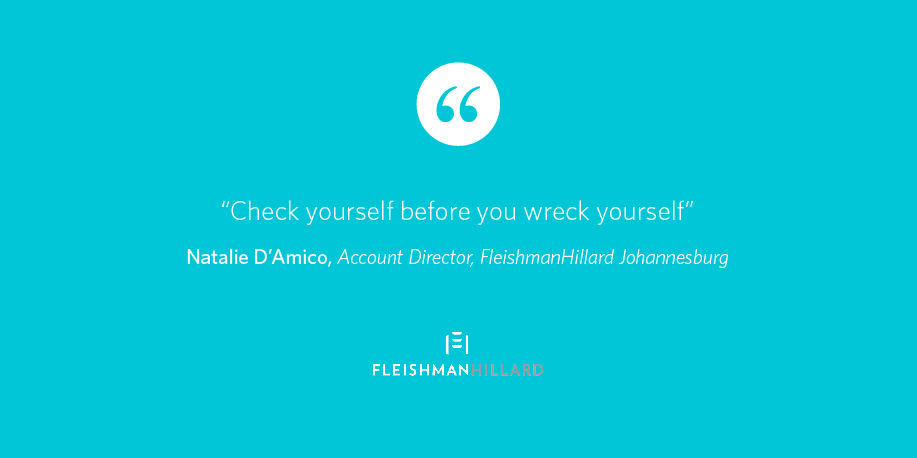Check Yourself Before You Wreck Yourself
As of late, things in South Africa have been quite interesting. People offended, debates sparked, movements encouraged and law suits laid (and won).
It’s been encouraging to watch the intensity of individual beliefs spark conversations, transparent conversations that needed to be had
As individuals, this is great. But as employees of brands, things can become a little blurred. Most of us represent someone else’s reputation and image in the companies we work for or represent. This alignment to a brand is often forgotten in the heat of a moment.
So where does the line start and stop? Is there even a line or do we just choose a line when it suits us? Deleting a tweet is no longer quick enough, someone, somewhere saw it and will use it. Stating that views are your own is also not lawsuit proof. The reality is, you represent yourself and your company.
Something I learned very recently is the ability to recognise my and other people’s emotions and to be able to discriminate between those feelings and label them appropriately – understanding why one reacts the way they do. Understanding your personal EQ (Emotional Intelligence) will help to guide your thinking and behaviour more appropriately.
In an effort to avoid a very messy, expensive and potentially embarrassing moment that will be used as case study material for years to come, here are some reflective steps to note before posting online, speaking publicly or even socially.
- Take a moment and reflect: Stop and think, is what I am about to say offensive, insensitive, rude, degrading and does it go against human rights? Emotions can blur objectives.
- Context: Do you fully understand the context of the situation, have you gone through the background to make sure you have the story straight? It is so important to interrogate the source to determine if it is trustworthy and reliable.
- Are your cheeks flushed and your heart racing: Take a moment to calm down. Nothing good ever came from responding in a moment of anger. Type it up, walk away for a while and re-read it. If you still feel the same then send it.
- Name calling: Just don’t. You have to be over a certain age to operate on social platforms – let’s just act that age.
- If you find yourself in a precarious situation: Be prepared to take responsibility and apologise. Opinions are just that, opinions. It doesn’t make you right or perfect. Know when an apology and white flag is necessary. For more on how to handle a corporate apology, give this powerful blog a read: http://v1.fleishman.co.za/2015/11/the-essence-of-the-corporate-apology/
- The power of consult: There are specialists who spend their days protecting, managing and growing people and brand’s reputations. Having a third party look at a situation objectively backed by years of experience can only help, if you are willing to actually listen and act on it. If you don’t have this luxury, ask a friend, someone who isn’t afraid to tell you the truth.
For some, this may seem cumbersome and defeating the point of expression, but these simple steps could singlehandedly prevent front page Twitter news and save your personal reputation.

Written by: Natalie D’Amico
Find Out More
-
Digital Insights Bulletin - October 2024
October 31, 2024
-
Sharon Piehl Wins 32nd Annual John D. Graham Award for Excellence
October 25, 2024
-
Digital Insights Bulletin - September 2024
September 30, 2024


